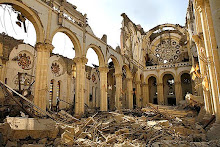 "This day shall be a memorial feast for you, which all your generations shall celebrate with pilgrimage to the LORD, as a perpetual institution."
"This day shall be a memorial feast for you, which all your generations shall celebrate with pilgrimage to the LORD, as a perpetual institution."In the sense of Sacred Scripture the memorial is not merely the recollection of past events but the proclamation of the mighty works wrought by God for men. In the liturgical celebration of these events, they become in a certain way present and real. This is how Israel understands its liberation from Egypt: every time Passover is celebrated, the Exodus events are made present to the memory of believers so that they may conform their lives to them.
-- CCC 1363
I received from the Lord what I also handed on to you,
that the Lord Jesus, on the night he was handed over,
took bread, and, after he had given thanks,
broke it and said, "This is my body that is for you.
Do this in remembrance of me."
In the same way also the cup, after supper, saying,
"This cup is the new covenant in my blood.
Do this, as often as you drink it, in remembrance of me."
For as often as you eat this bread and drink the cup,
you proclaim the death of the Lord until he comes.
-- 1 Cor 11:23-26
In the New Testament, the memorial takes on new meaning. When the Church celebrates the Eucharist, she commemorates Christ's Passover, and it is made present: the sacrifice Christ offered once for all on the cross remains ever present. "As often as the sacrifice of the Cross by which 'Christ our Pasch has been sacrificed' is celebrated on the altar, the work of our redemption is carried out."
-- CCC 1364
"Do you realize what I have done for you?
You call me 'teacher' and 'master,' and rightly so, for indeed I am.
If I, therefore, the master and teacher, have washed your feet,
you ought to wash one another's feet.
"Teacher, what good deed must I do, to have eternal life?" To the young man who asked this question, Jesus answers first by invoking the necessity to recognize God as the "One there is who is good," as the supreme Good and the source of all good. Then Jesus tells him: "If you would enter life, keep the commandments." And he cites for his questioner the precepts that concern love of neighbor: "You shall not kill, You shall not commit adultery, You shall not steal, You shall not bear false witness, Honor your father and mother." Finally Jesus sums up these commandments positively: "You shall love your neighbor as yourself."
-- CCC 2052
(Art: Washing of the Feet, Duccio di Buoninsegna, 1308-11, Tempera on wood, Museo dell'Opera del Duomo, Siena. From the reverse central part of the Maesta.)








